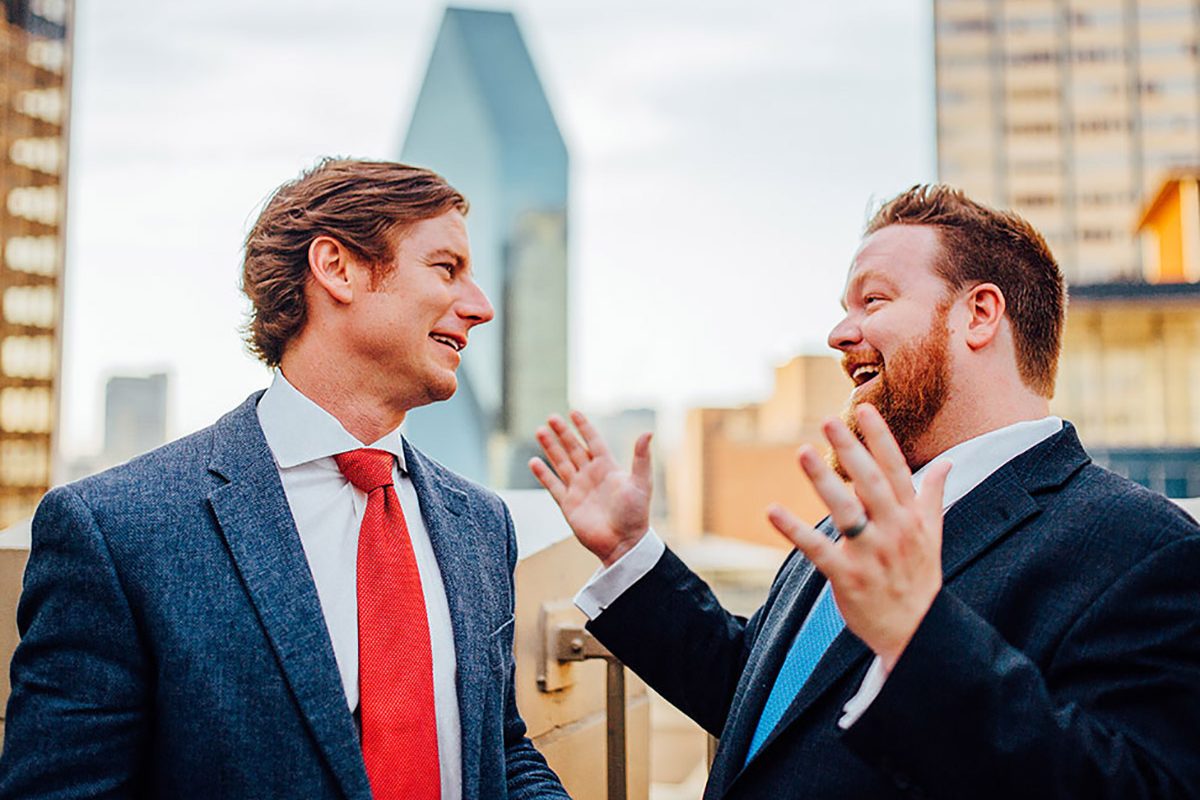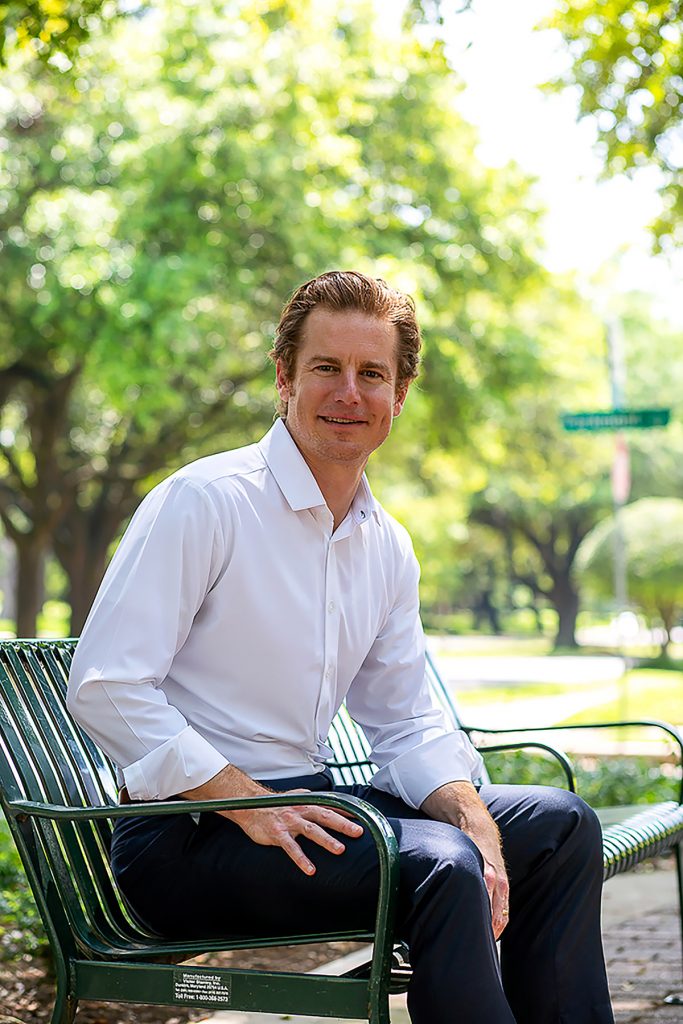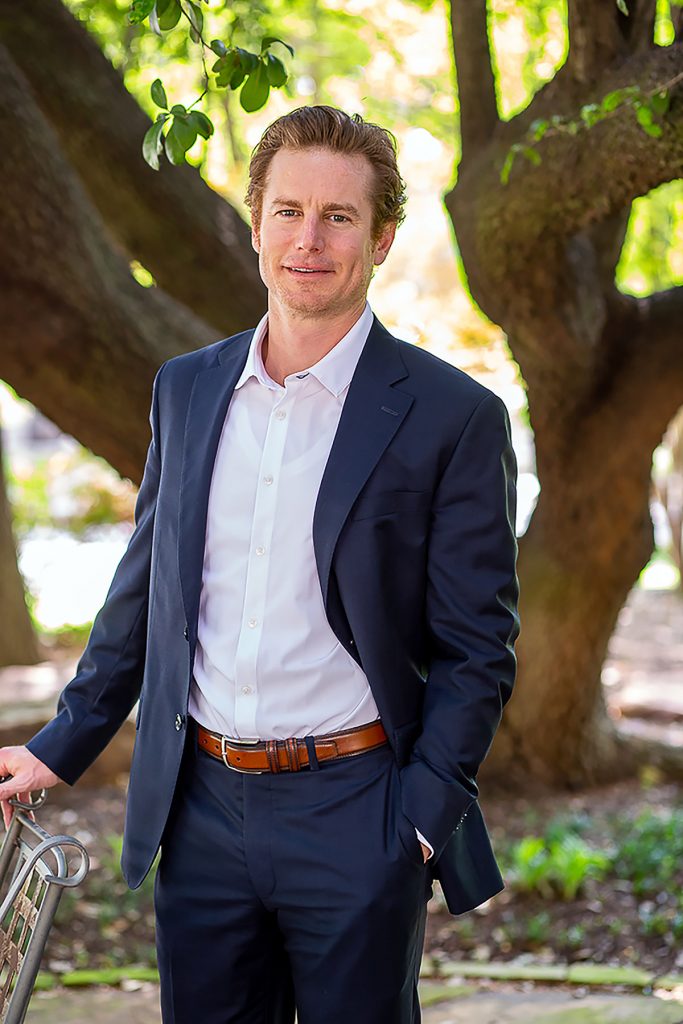
Chris Hamilton and Paul Wingo lead a Dallas law firm. Courtesy of Hamilton Wingo LLP
Chris Hamilton Fights for Justice
The attorney was on the frontlines defending detainees after President Trump’s travel ban.
When Chris Hamilton ’00 was a freshman in college, a professor noted his ability to think on his feet and suggested he consider a career in law. “It was something I took to heart,” Hamilton recalled, “and I found that I was good in public speaking situations so I decided to go to law school.”
The Dallasite followed his TCU BA in economics with a JD from the UT School of Law before joining Legal Aid of Northwest Texas as a lawyer. The nonprofit provides civil legal help to low-income residents.
“I got a lot of trial experience,” he said. “People were so desperate for legal help that they were willing to have a completely unqualified and inexperienced lawyer do anything he could for them. I was the only hope for my clients.”
Day after day Hamilton went to court, trying small cases such as evictions and repossessed cars.
“The part that really stuck with me long term was just how much legal help in what seems like a relatively small dispute can mean to people,” he said.
Hamilton still has Legal Aid ties — his firm sponsors a satellite clinic in South Dallas. “I think it’s very important for the community.”
The Firm
After a full year of trial court experience, Hamilton was ready to hang up his own shingle and with a partner founded Standly Hamilton LLP in 2005.

Attorney Chris Hamilton founded Lawyers for America, a nonprofit that offers legal assistance to people whose rights have been violated. Photo by Mark Graham
“I have always had an inability to take orders from other people,” he said with a laugh. “I think it was pretty clear that I was going to have to be my own boss. Whether I was ready for that at 26 years old, I’m not sure.”
In the beginning, it was an “anything and everything” kind of firm. “Whatever would walk in the door, that was what kind of firm we were,” he said.
Hamilton focused on civil cases and found opportunity in contingency. “Nobody was going to write a retainer to a lawyer who only had a year of experience, but if I could get paid only if I won, I had a better chance of getting hired. I started doing all sorts of different cases.”
Within his first few years, he developed a niche for business contingency cases and then expanded into catastrophic personal injury and other complex civil litigation, including False Claims Act, product liability and civil negligence cases. In April 2020 the firm also began accepting contingency cases to represent companies in business interruption claims relating to the COVID-19 shutdowns.
“For a lot of firms, it’s just a case or a job, but for us it’s a calling and a cause. That’s something we try to instill from the top lawyer to every staff person in the firm,” he said. “Having people who really believe in the cause they’re fighting for is a potent weapon. And when you’re going against an adversary who doesn’t really believe in their case, it’s a difference maker. So that’s culturally what sets us apart.”
In 2017 the firm changed its name to Hamilton Wingo LLP when Hamilton brought on a new partner.
Multimillion-dollar Verdicts
In recent years Hamilton has won numerous high-stakes cases. In 2011, a $39.4 million jury verdict was among the largest breach of contract verdicts in Texas.
In 2014, his $27 million compensatory damages jury verdict against McDonald’s Corp. was the largest personal injury verdict in Texas and the 17th largest jury verdict in the U.S.
“Jury trials are all about psychology — the way people make decisions.”
Chris Hamilton
Hamilton took on a wrongful death case against the fast food giant. A man had been fatally beaten at a McDonald’s that had a long history of violence and public disturbances in College Station, Texas, he said. At the time, the food service industry was expanding into late-night hours — midnight to 4 a.m.
“McDonald’s was leading the charge and was refusing to provide security for these late-night shifts even though industry data showed that it was needed and they were having lots of problems,” he said. “So it was a seminal case in sending a message to the fast food industry that to sell food in the middle of the night, you’re going to have to provide security for people, particularly for the locations that dictate that need.”
Five years later, one of Hamilton’s cases received a $19.7 million jury verdict and became the largest medical malpractice verdict in Texas. In 2017 his $18.3 million arbitration award for negligent misrepresentation in a commercial case involving the sale of a medical device company was among the state’s biggest awards.
“Jury trials are all about psychology — the way people make decisions,” he said. “I don’t have a degree in psychology, but that’s really my area of expertise. I’ve done a lot of reading. Having that expertise in the study of psychology is another weapon in the arsenal for our clients that I think sets the firm apart.”
Justice for All
Another big win came in 2017 — in his pro bono work. That January, U.S. Customs and Border Protection officials began detaining travelers at DFW International Airport following President Donald Trump’s controversial executive order banning the entrance of people from seven countries into the U.S.

With one year of experience under his belt, Chris Hamilton founded his own law firm. Photo by Mark Graham
Hamilton was on the front lines.
“When the news reports explained that international travelers with valid visas to enter the United States were being denied entry on the basis of their presumed religion, as a lawyer, I felt compelled to do something,” recalled Matt Mitzner, now an attorney with Mitzner LLP in Dallas. Mitzner’s employer at the time allowed him to go to the airport to help, but forbid involvement with the media. “I knew Chris would be a perfect person to call to ask for help because of his abilities and experience dealing with the press. He agreed to go with me, and we both put out calls on social media asking other lawyers to come out to DFW Airport to help us. We were shocked to see more than 100 lawyers show up at the meeting to help.”
Hamilton secured space for a “war room” at the hotel inside the airport’s international terminal, where work was delegated and Lawyers for America was formed.
“We saw that there was a need to help in a situation and there was no infrastructure to allow that to happen so we spontaneously formed Lawyers for America to fill that gap,” Hamilton said.
Over the nine days between Jan. 27 and Feb. 4, U.S. Customs and Border Protection officials detained 78 people at DFW International Airport, Mitzner said, noting that 53 percent were women, 86 percent were lawful permanent residents, two had Immediate Relative visas and seven had B2 (tourism) visas. One had a Special Immigrant Visa for his service to U.S. armed forces. Lawyers for America filed a complaint for habeas corpus to secure his release, which soon followed.
“Through his leadership and courage, Chris became the unarguable leader of the entire organization, which raised over $25,000 in small donations in less than 24 hours to help fund the expenses for our work,” Mitzner said.
The American Association for Justice named Hamilton a 2017 Pro Bono Lawyer of the Year.
“I think what we were able to do had an immediate impact in that specific situation where there were serious due process and constitutional issues that were at stake,” Hamilton said, “and we were able to connect lawyers in Dallas to their communities and serve as a stepping stone for them to become involved in broader community service.”
The volunteer lawyers remained active for about a year.
“The group we formed was never going to be a permanent solution, but it played an important role during a time when there were no other organizations to step up and do what we did. Now there are national organizations that have expanded into Texas and local organizations that have grown up,” Hamilton said.
“There’s not an ongoing need, but we still have the ability to get together a lot of people who would be willing to step up and volunteer their services if they thought there was something that threatened the rule of law issue in the United States.”

Your comments are welcome
Comments
Related reading:
Alumni, Features
Asylum-Seekers Find Solace in DASH Network
The Dallas-Fort Worth nonprofit provides housing as well as support and friendship for people fleeing persecution.
Research + Discovery
Ideas of Terrorism Transfer to Latin American Immigrants
A sociologist finds the unease affects U.S. views and laws.
Alumni, Features
Swanee Hunt Pushes for Inclusion of Women in Peace Building
The humanitarian champions women helping their countries recover from war.